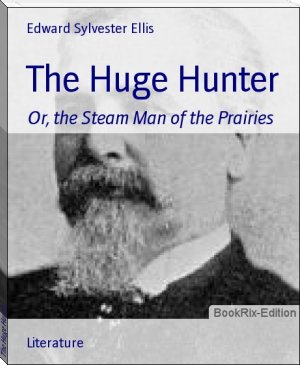The Life of Kit Carson: Hunter, Trapper, Guide, Indian Agent and Colonel U.S.A. by - (best motivational books to read TXT) 📗

- Author: -
Book online «The Life of Kit Carson: Hunter, Trapper, Guide, Indian Agent and Colonel U.S.A. by - (best motivational books to read TXT) 📗». Author -
CHAPTER VIII. Carson and two Companions set out on a Trapping Expedition of Their Own—They Meet With Great Success—Is Engaged by Captain Lee—Carson's Pursuit of an Indian Thief.
Kit Carson finally grew tired of wandering over the country without gaining sight of a beaver. He proposed to two of his companions that they start on a private expedition of their own. They were as disgusted as he and eagerly agreed to the proposition.
The employers of the men commended the enterprise of the little company and gave them their best wishes. Cordial farewells were exchanged all around, and Kit and his comrades left the camp on their perilous errand.
On this occasion, as on innumerable other ones, Carson showed most excellent judgment. His scheme was to keep entirely to the streams never once venturing upon the plains. Several advantages were likely to flow from this course. During the summer season the mountain Indians generally placed their women and children in charge of the old men and a few warriors and came down from their retreats to engage in hunting bison or in marching on the war path. Occasionally they are at peace with the Indians of the plains, which was a bad thing for the Mexican settlements, for they left a track of desolation among them.
Few of the trappers ventured far into the mountains, where game was abundant, so that Carson was confident of finding plenty of beavers. In this he was not mistaken. The fur bearing animals seemed to be overrunning the country, while the Indians acted not only as if unaware of the fact but as if entirely ignorant of the little party of visitors, who, making hay while the sun shines, were not long in finding themselves with as large a supply as they could carry home.
This was the ordeal more to be dreaded than all the others. While on their way to the beaver runs, they had nothing to do beyond taking care of themselves; but now their valuable peltries were liable to be captured by the Indians, who could compel their abandonment by pressing the owners hard.
But extreme and altogether unexpected good fortune attended them, and they reached Taos, without receiving a scratch or losing a fur. They found on arriving at that quaint town, that there was great demand for peltries and prices were correspondingly high. They sold out their stock for a very liberal price, and Kit's friend, despite his advice, went on a carousal which soon squandered all their hard earned wages. Kit himself, however, had not lost the lesson he learned under somewhat similar circumstances, and he laid away his funds, against the proverbial rainy day.
By this time the character of Carson was fairly formed. He was resolute, self reliant, sober, thoughtful, cool headed, wonderfully quick to grasp all the points of a situation, chivalrous, agile as a panther, a perfect master of woodcraft, and withal, charmingly modest.
While Carson was in Taos, waiting for some favorable opening to present itself, he met Captain Lee, formerly of the United States Army, but who was then a member of the firm of Bent and St. Vrain, engaged for so many years in furnishing supplies to those who visited the mountains and plains. Captain Lee at that time was thus employed and knowing the value of a man like Carson, he made him so liberal an offer that he accepted it on the spot.
In the Autumn of 1832, with a train of mules loaded with such goods as were needed by trappers, Captain Lee, Carson and a number of men started northward to find their purchasers. They followed the well worn mule path leading from New Mexico to California and which had been known for years as the "Old Spanish Trail."
They reached White River without mishap, and made their way down it until Green River was forded, when they struck across the country to Winty River, where they came upon a party of twenty hunters, who were engaged in trading and trapping as opportunity offered. They affiliated at once, for there is something in the presence of a common danger which draws men closely together.
The weather became very cold and snow began to fall. It was decided, therefore, to go into winter quarters near the mouth of Winty River. There they erected skin lodges, such as are used by many tribes of American Indians, and were content to wait the coming of spring.
The skill and address of Carson seemed to create a call for his services, no matter where he happened to be, and it was not long before he became involved in a most remarkable adventure.
Among the employees of the other party, was a shrewd civilized Indian, who was held in high regard by the whites on account of his native keenness, and who stood well in the confidence of his employer; but one day he disappeared, simultaneously with several of the very best horses. The circumstances were such that there could be no doubt the two occurrences were inseparably connected.
The loss was too serious to be borne, and the angered leader of the other company (though he had not the least claim upon young Carson), appealed to him to help him to recover his property. Carson said he was perfectly willing, provided Captain Lee would give his consent, and as the Captain was more willing to help his friend, he directed Carson to do as he saw fit.
The matchless hunter made sure his weapons were in the best order, and, mounting one of the fleetest horses in camp, he waved a merry farewell to his friends and galloped off. He had not ridden far when he turned off toward an Indian village, whose people were on friendly terms with the hunters, and, riding directly among the red men, whose lingo he understood, he asked for one of their bravest warriors to join him in hunting down a California Indian that had run off with their best horses.
Such a request coming from any other hunter would have received little notice; but those dusky barbarians not only knew Carson by name, but looked upon him as the greatest white warrior they had ever seen. He could have secured a score of braves had he wanted them, but he desired only one—a sinewy, daring fellow whom he knew could be relied on in any emergency. This Indian required no more time than Carson himself to make ready, and, shortly after Kit's arrival in the village, he rode forth again with his faithful friend at his elbow.
It was impossible for the thief to conceal the trail of the stolen horses and he made no attempt to do so. A slight examination showed the pursuers that it led down the Green River, the general course being such that Carson was confident the thief was making for California—a long distance away.
As the fugitive was well mounted and all his horses were fleet, and as he must have been quite certain he would be pursued, he lost no time on the road. The trail showed he was going at a full gallop, and, under the most favorable circumstances, the chase was sure to be a long one.
CHAPTER IX A Hot Pursuit—An Unexpected Calamity—Carson Continues the Chase Alone—The Result.
Everything now depended on speed. Not only was the dusky thief pushing his animals





Comments (0)